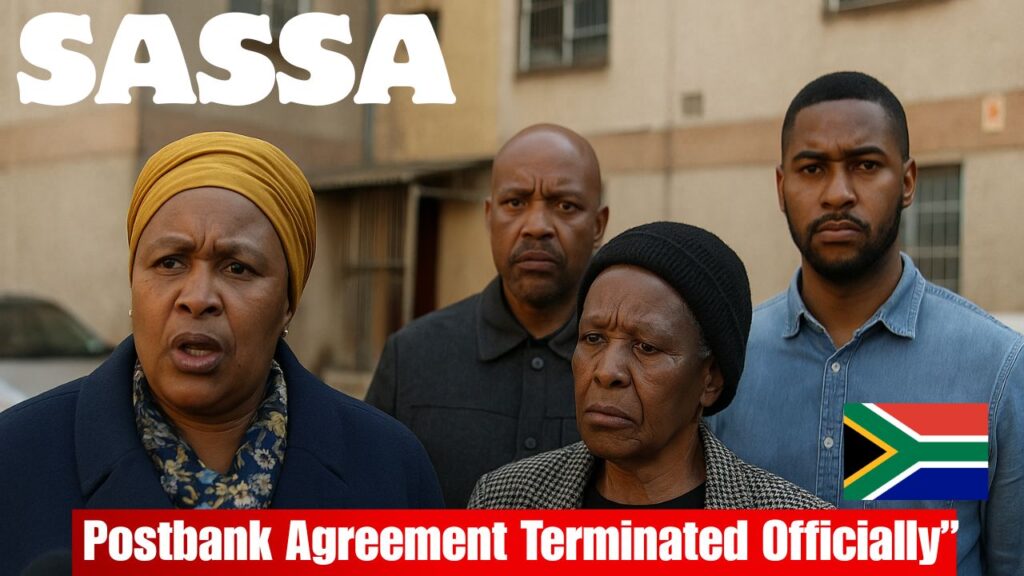The termination of the Master Service Agreement (MSA) between the South African Social Security Agency (SASSA) and Postbank has raised major public and parliamentary concern. This agreement, which governed the payment of social grants, played a crucial role in ensuring timely disbursement of funds to millions of beneficiaries. With the committee noting the termination, questions about future payment systems, service continuity, and accountability have emerged. This move has put pressure on both entities to ensure uninterrupted access for vulnerable South Africans who depend on these grants for survival.

Committee’s Observation on the SASSA–Postbank Agreement Termination
The parliamentary committee has expressed deep concern over the sudden end of the Master Service Agreement between SASSA and Postbank. Members highlighted that the agreement was central to ensuring smooth payment distribution to over 19 million beneficiaries. They urged both SASSA and Postbank to maintain service continuity while transitioning to any new arrangement. The committee emphasized that any disruption could severely impact pensioners, child support recipients, and people living with disabilities who rely on social grants for basic needs.
Impact on Beneficiaries and Grant Payment System
The termination of the agreement could cause delays in social grant payments, particularly for those who depend on Postbank cards or collection points. SASSA has assured the public that contingency plans are in place to prevent disruptions, but anxiety remains among beneficiaries. Experts have also pointed out that this could open opportunities for private banking partnerships to improve digital and biometric payment methods. Maintaining transparency and ensuring data protection during this transitional phase is now a top priority for SASSA and the Department of Social Development.
 New Retirement Law May Cut Gratuity for Some Employees – Eligibility Tightened for Some Staff
New Retirement Law May Cut Gratuity for Some Employees – Eligibility Tightened for Some Staff
Future Plans and Government’s Response
Following the termination, the government is exploring new payment service models to strengthen the social welfare system. SASSA is likely to introduce enhanced digital payment infrastructure in collaboration with other financial institutions. This will include more secure, technology-driven systems for verifying beneficiaries and preventing fraud. The Department of Communications and Digital Technologies has also been called upon to assist in upgrading systems and ensuring stable digital infrastructure across South Africa, especially in rural areas.
Public Accountability and Oversight Measures
The committee has called for full transparency and accountability from both SASSA and Postbank. A detailed report on the reasons behind the termination, financial implications, and alternative service options is expected in upcoming parliamentary sessions. Civil society groups have urged the government to prioritize public consultation before finalizing new agreements. Ensuring uninterrupted payment distribution remains the government’s primary responsibility, especially given the financial hardship faced by millions of South Africans relying on social grants every month.
| Key Aspect | Details |
|---|---|
| Agreement Name | Master Service Agreement (MSA) |
| Parties Involved | SASSA and Postbank |
| Termination Date | October 2025 |
| Main Concern | Possible disruption in social grant payments |
| Beneficiaries Affected | Over 19 million South Africans |
| Government Action | Exploring alternative digital payment partners |
| Oversight Authority | Parliamentary Social Development Committee |
FAQs
1. Why did SASSA terminate its agreement with Postbank?
The agreement was ended due to unresolved operational and financial management issues.
2. Will social grant payments be affected?
SASSA has assured that payments will continue without interruption through alternative channels.
3. What will replace the Postbank payment system?
New digital payment systems are being explored to improve reliability and security.
4. Who oversees the transition process?
The Parliamentary Social Development Committee is monitoring the transition to ensure accountability.





